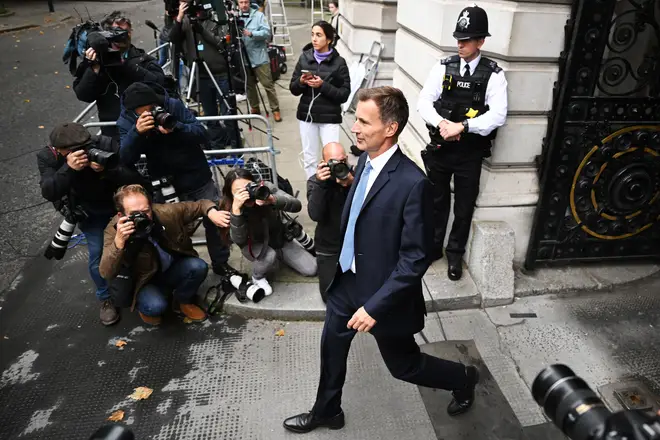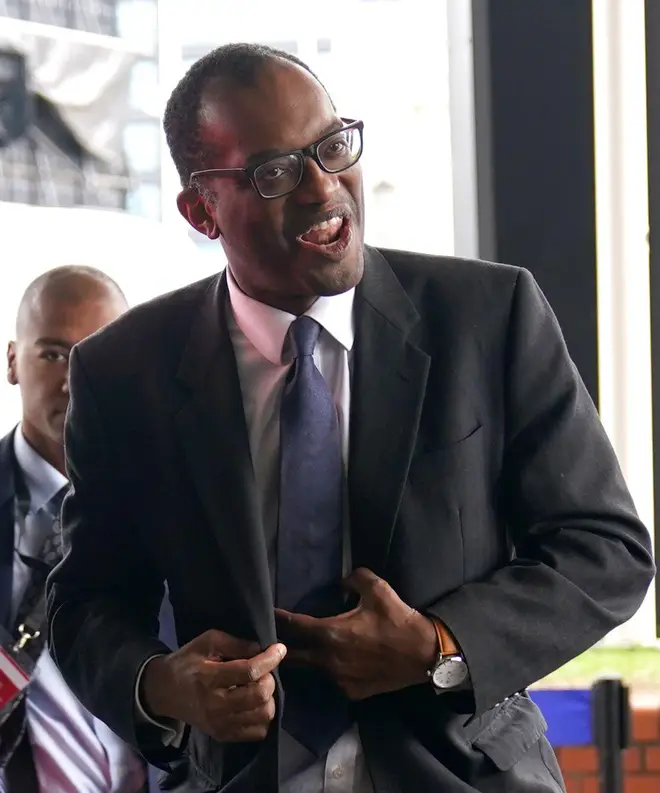
Shelagh Fogarty 1pm - 4pm
15 October 2022, 09:26 | Updated: 15 October 2022, 14:34

The new chancellor has told LBC he 'expects' the Prime Minister will survive in the job for the next fortnight - amid reports his predecessor Kwasi Kwarteng told allies that sacking him only bought her 'a few weeks’.
Jeremy Hunt told LBC this morning: ““I expect Liz Truss will survive the next two weeks. The last thing the country wants is another long period of uncertainty.”
He said he has no desire to be Prime Minister himself.
On the economy, he said: “We aren’t going to be able to cut taxes as quickly as we wanted and some taxes will have to go up.”

Jeremy Hunt and Andrew Castle discuss the future of the UK economy.
He refused to be drawn on any upcoming measures, saying: “We are going to be thinking top of our mind, struggling businesses, struggling families.
Read more: Time 'running out' for Truss as Tories turn on her after humiliating tax u-turn

“It’s not going to be a return to austerity by 2010.
“We are doing everything we can to bear down on inflation. Inflation itself is a very dangerous cause of long-term instability in the economy.”
On mortgages, Mr Hunt said: “To people worried about their mortgages going up - we can’t stop them going up, but we want people to be confident that the government is doing everything it can do.”
“It’s a big job I’ve got. It’s a very, very challenging time," he told Andrew Castle.
“There were two big things that weren’t right. The first was to cut the tax paid by the very wealthiest people.
“The second was flying blind and making that announcement without the OBR vetting whether the numbers would add up.
“My job now is to help bring back stability for people who are worried about their mortgages.

Andrew Marr weighs in on Liz Truss and Jeremy Hunt
“Our priorities when we take those tough decisions will be families and businesses.
“We aren’t going to be able to cut taxes as quickly as we wanted and some taxes will have to go up."
"We want Britain to have the lowest business taxes of any major country.
"We need to sort out the growth paradox, we’ve got to find a way of boosting growth. Low business tax is part of that.
"Corporation tax - it’s not going to be possible to reduce it as quickly as either she or I wanted."
On the PM’s credibility, he said: “I don’t want to pretend its been anything other than a very difficult few weeks.
"The electorate are going to judge us more on what’s happened over the last 18 months than what’s happened in the past 18 days.
"I have fundamental confidence in Britain and our economy."
At a brief news conference in Downing Street on Friday, Ms Truss had dismissed calls for her resignation, saying she is "absolutely determined to see through what I have promised".
"It is clear that parts of our mini-budget went further and faster than markets were expecting, so the way we are delivering our mission right now has to change," she said.
"We will do whatever is necessary to ensure debt is falling as a share of the economy in the medium term."
It is still to be determined whether Friday's embarrassing U-turn will be enough to turn things around, with multiple reports of Tory MPs and Conservative grandees plotting moves to force her from office even as Cabinet ministers remained publicly loyal to the Prime Minister.
The Times newspaper even cited a source apparently close to Mr Kwarteng suggesting that Ms Truss may only have bought herself a few more weeks in office.
To many observers, it appeared that the end could be nigh for the Prime Minister after only a few weeks in the job. Former Conservative leader Lord Hague warned that Ms Truss's premiership "hangs by a thread", while Conservative former chancellor Lord Hammond said the events of the past weeks had wrecked the party's reputation for fiscal discipline.
Loyal MPs on Friday night were urging party colleagues to think again about any bid to oust Ms Truss, who is theoretically safe from a leadership vote for another year under the rules of the backbench 1922 Committee.